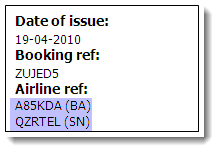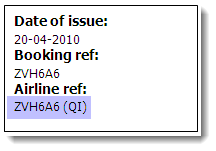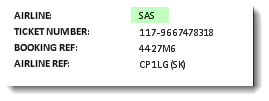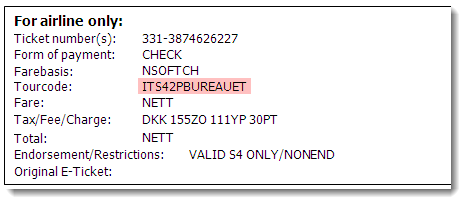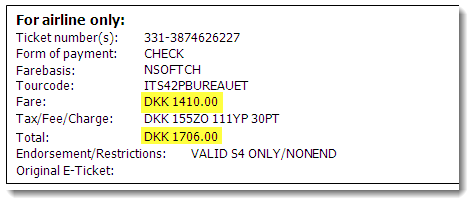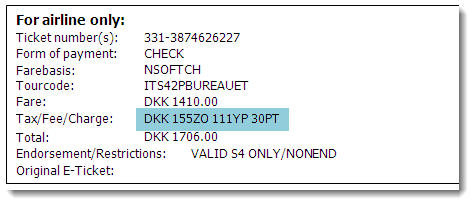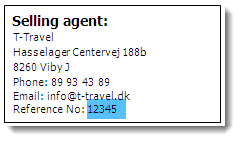Table of Contents
E-Ticket Content In Details
Most data displayed in E-Ticket becomes transferred from a PNR (see for details: PNR Data). Please look at described examples below.
Read also: E-Ticket Templates and PNR Data.
✔ Date of Issue
The date when corresponding air file was created.
✔ Booking ref
PNR number in a reservation system (Amadeus, WorldSpan, Sabre, Galileo, etc.).
✔ Airline ref
Internal airline system's flight segment booking number. There can be several airline codes when segments are operated by different airlines.
Note
The only record for the first airline is shown when airline references are the same.
Example
✔ Airline (JTB E-Ticket)
✔ Name
Passenger's First and Last names, Title, Type.
Examples
Also
Oversized or passenger, needing additional space, gets the word IDEXST added in the name.
✔ Airline/Flightnumber
✔ Date
Usually Arrival and Departure flight dates are equal, that is why only Departure date is displayed in E-Ticket. But when the dates are different 'Arr.' becomes displayed as '+1'.

Note
1. Both Departure and Arrival dates are written in Amadeus:
and WorldSpan airfiles:
But in Sabre airfiles there is departure date only:
'+1' in E-Ticket is defined by rules:
in Sabre
when arrival time earlier than departure time
and flight time > 3 hours,
then the date is 'departure date + 1', i. e. the next day.
For example, here, 30DEC - Departure date, 1120 - Departure time, 0605 - Arrival time, 11.45 - Elapsed Flying Time)
2. OPEN segments (flight date has not been determined yet):
Departure date, but no Arrival date:
Nor Departure, nor Arrival date. In this case the word OPEN is dispalyed instead of dates:
✔ Baggage and Status
Specified for each flight segment.
In Amadeus and WorldSpan PNRs are written in flight segments’ lines:


In Sabre are written in a separate line:

Note
When there are various passenger types in the same PNR (may occur in WorldSpan or Sabre, not Amadeus) then:
- Baggage restrictions for CHD and ADT are the same;
- Baggage restrictions for INF = 10K.
Example
(2 ADT + CHD+ INF are in a WS file)
✔ Ticket number(s)
Airline code and ticket number are shown.
✔ Form of Payment
Determined based on PNR text by the following logics:
| In PNR | On E-Ticket |
|---|---|
| NONREF, AN | NONREF |
| EC | EUROCARD |
| DC | DINERS |
| AX | AMERICAN EXPRESS |
| CA, MC | MASTERCARD |
| DK | VISA/DANKORT |
| VI | VISA |
| Anything else | CHECK |
Example
✔ Farebasis
Airline's fare rules. Fare codes start with a letter followed by optional letters and digits.
In a PNR text farebasises are listed in M-line for each segment but in E-Ticket only different Farebasises become displayed.
✔ Tourcode
Specific agreement with an airline. Mostly becomes inserted by CRS (Amadeus or WorldSpan) if we can auto price the PNR; can also be inserted manually.
Examples
✔ Fare
Price paid for the ticket to GDS.
By default this price is hidden in E-Ticket : the word ‘NETT’ is shown in Fare and Total lines:
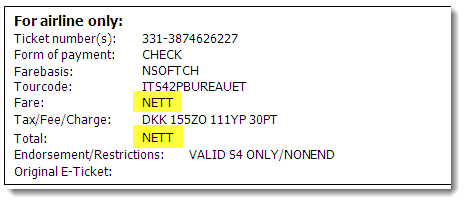
But if you check 'Show Fare prices in E-Ticket' in Invoice form, then prices from PNR become shown:

Examples
✔ Tax/Fee/Charge
Taxes list.
Examples
Note (for WorldSpan and Sabre)
if there are more than 3 taxes then they are not written in one line – the rest taxes beside two are collected under XT tax. XT tax is broken into separate codes/amounts in specific lines.
Examples
✔ MCO: EMD
- E-Ticket is created for EMD (TW loads tickets by pnrsegmentpassengerTravelDoc table and thus not loading ticket related to PNR only.
- Free text is taken from MCORemark field in 'Tax/Fee/Charge' section. It states 'PRE RESERVED SEAT ASSIGNMENT'.
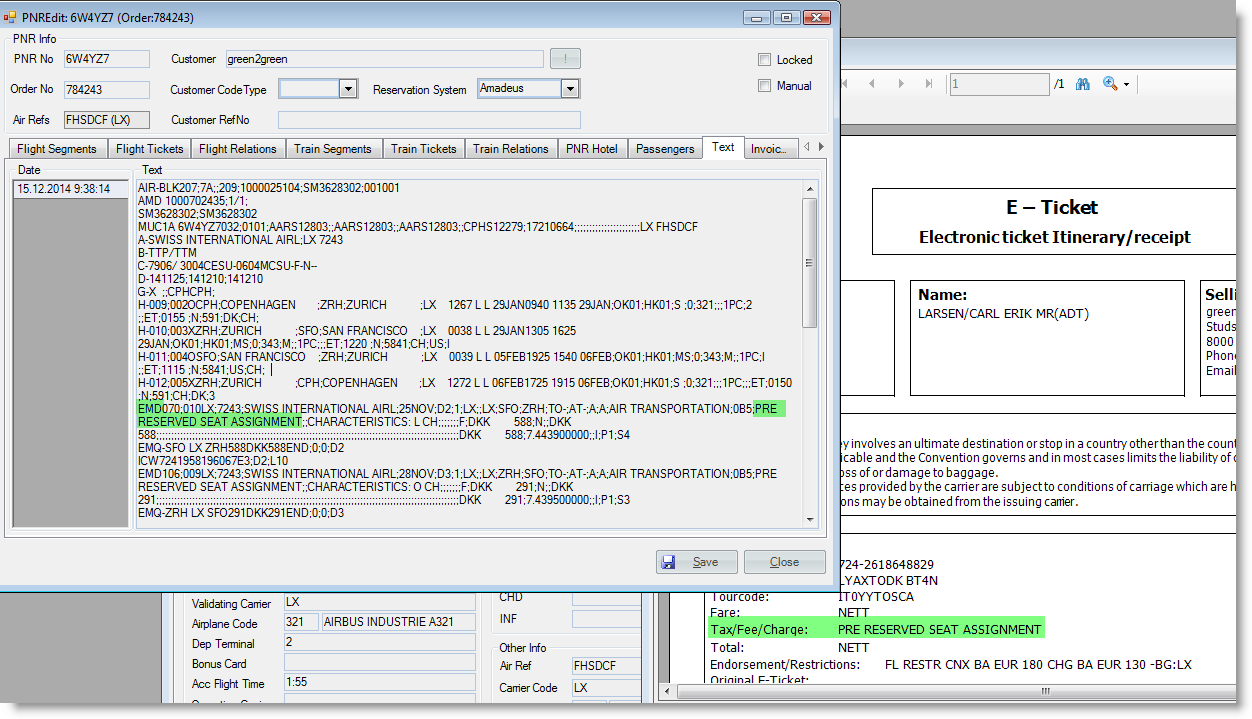
Note
- EMD tickets are not linked to the segments, but directly to PNR.
- Text in invoice line for EMD has no routing, looks like: 'PRE RESERVED SEAT ASSIGNMENT'.
✔ PAID Taxes
If some taxes are paid already (it often happens for reissued tickets), then these taxes are shown with ‘PD’ letters.
Example
WorldSpan: (PAID taxes come in X-line instead of G-line, XT tax is displayed as one)


![]()
A tax can be registrated both as paid and unpaid.
Example
✔ Endorsement
Airline's set of rules for a specific price. Can be descriptive telling about change rules and refunds or laconical. In auto priced ticket it gets always defined by the system (according to what the airline wants to have), in manual ticket it becomes set according to the contracts.
Examples
✔ Original E-Ticket
If a current ticket (075-3789556194-195 on screenshot below) is a REISSUE ticket and if we know which ticket it has been issued instead (075-2096868407-08) then it becomes displayed in ‘Original E-Ticket’ field in E-Ticket:

'Old' ticket number:
WorlSpan:

where 6929279331332 is a new (reissued) ticket and 1609061120571 is an “old” ticket

